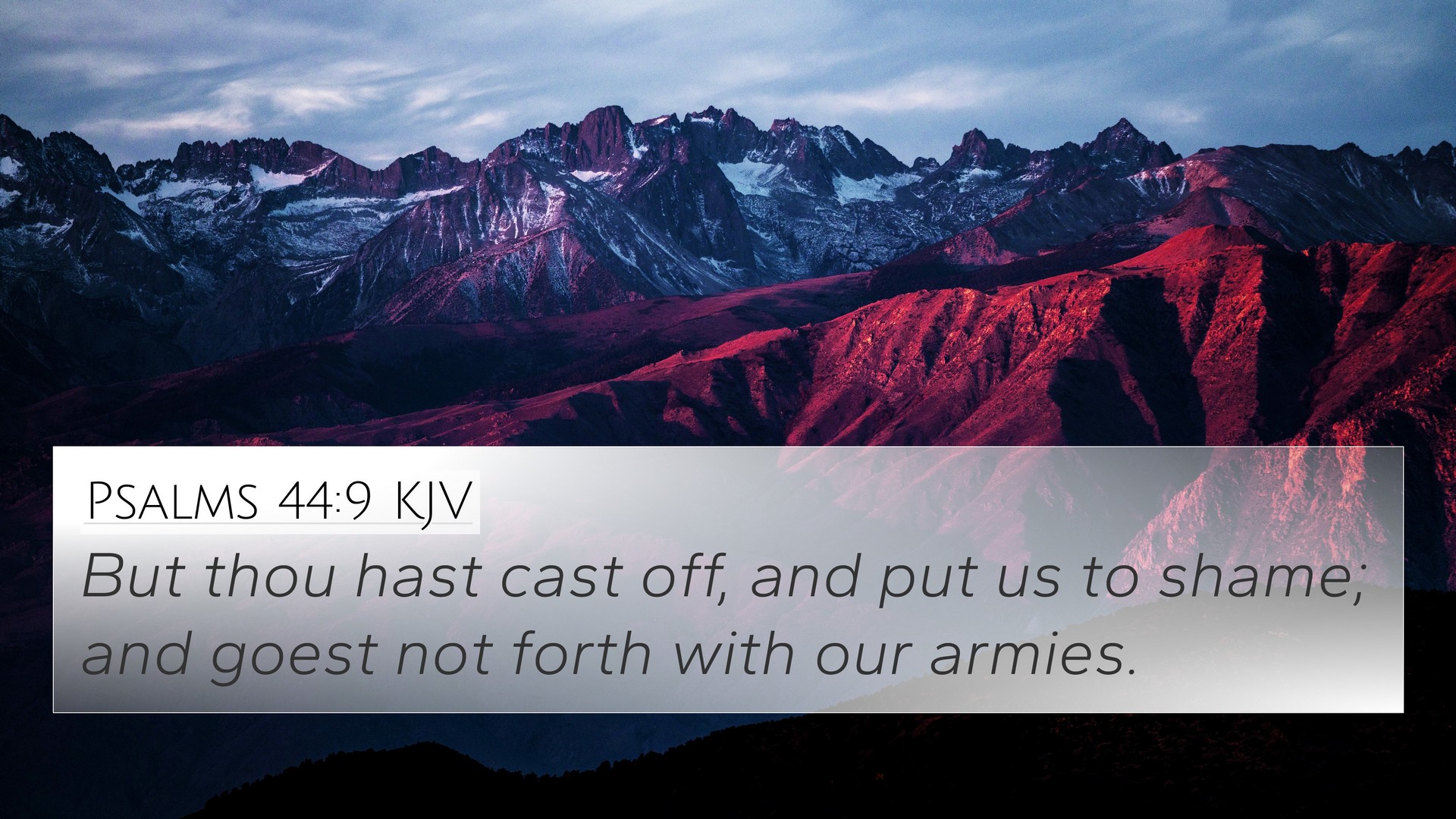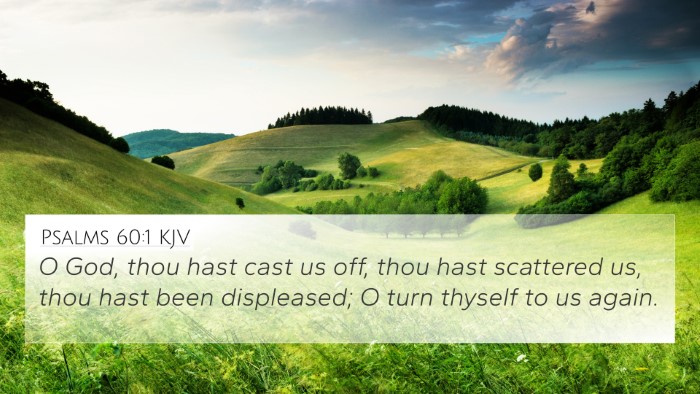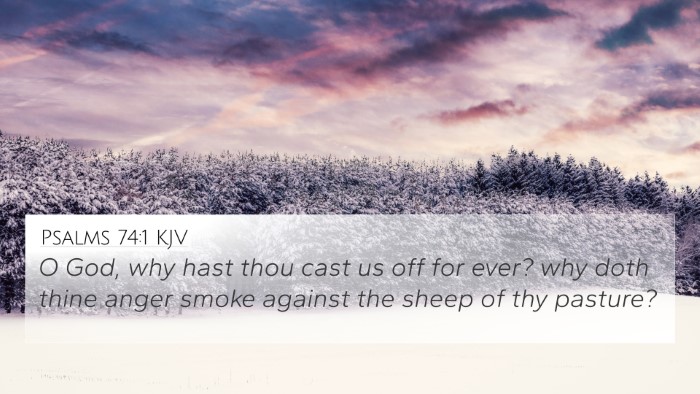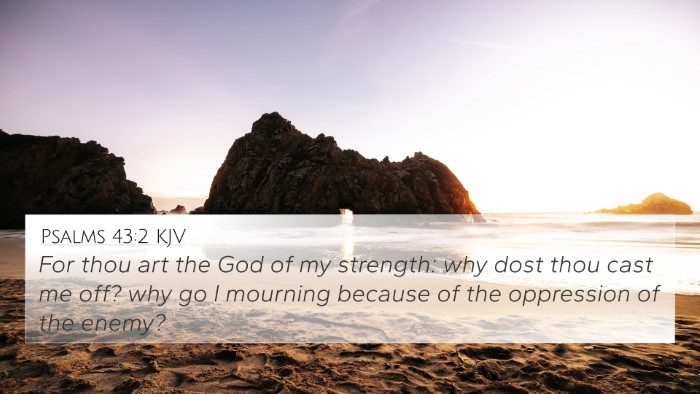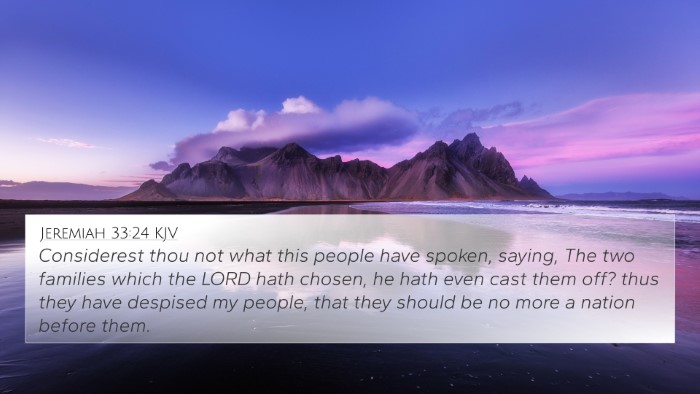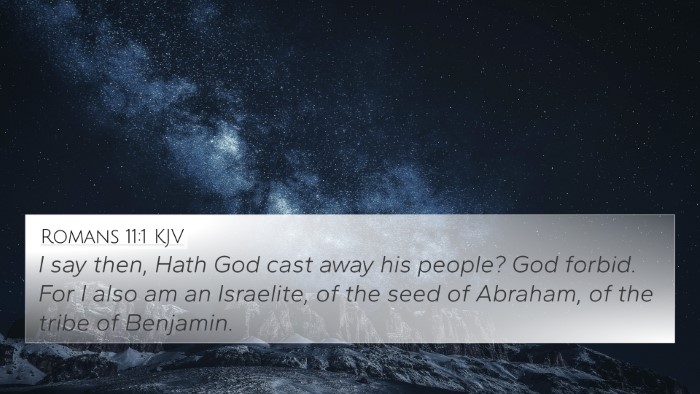Psalms 44:9 - Interpretation and Insights
Bible Verse: "But now you have cast off and put us to shame, and you do not go out with our armies." (Psalms 44:9)
Overview of Psalms 44:9
This verse is part of a lamentation in which the psalmist expresses anguish over apparent abandonment by God during times of struggle and defeat. The cry reflects a deep sense of shame and the feeling of being cast off during battle, which symbolizes a broader spiritual abandonment. This lament captures both the personal and communal suffering experienced by the people of God when they feel distant from divine support.
Thematic Analysis
Psalms 44:9 engages with themes such as:
- Divine Abandonment: The feeling of being forsaken by God in times of need.
- Shame and Defeat: The emotional repercussions of loss and feeling unsupported.
- Collective Identity: Reflects the shared experience of a community facing adversities.
Commentaries Summary
Matthew Henry notes that the psalmist laments the current situation where, despite previous victories, the people are now facing overwhelming difficulties. He highlights that God’s departure during battles is perceived as a divine reproach that leaves the community exposed to its enemies.
Albert Barnes emphasizes the contrast between past victories and the current plight. He suggests that this verse represents a crucial turning point where the psalmist recognizes the shift in fortune, provoking questions about God’s involvement and presence during struggles.
Adam Clarke provides insight into the psychological outcomes of feeling abandoned. He points out that the verse encapsulates a passionate plea for restoration, indicating a deeper desire for God's active participation in the lives of His followers.
Bible Verse Cross-References
The themes in Psalms 44:9 resonate with several other Scripture passages, illustrating the multifaceted ways in which abandonment and longing for God’s presence are articulated in the Bible. Here are some notable cross-references:
- Psalms 22:1: "My God, my God, why have you forsaken me?" – A profound expression of abandonment.
- Psalms 10:1: "Why, O Lord, do you stand far away?" – Reflects a similar sentiment of divine distance.
- Isaiah 54:14: "In righteousness you shall be established; you shall be far from oppression." – A reassurance of eventual divine support.
- Jeremiah 14:19: "Have you utterly rejected Judah? Does your soul loathe Zion?" – A cry questioning God’s commitment to His people.
- Matthew 27:46: "My God, my God, why have you forsaken me?" – Echoes the feelings of abandonment during suffering, linking the Old and New Testament experiences.
- Hebrews 13:5: "I will never leave you nor forsake you." – A promise of God’s steadfast presence.
- 2 Corinthians 1:9: "Indeed, we felt that we had received the sentence of death." – Another recognition of despair and divine silence in times of trial.
Connections Between Bible Verses
This analysis invites a deeper inquiry into the connections between various biblical texts. Understanding how different scriptures illuminate similar themes can enhance one's comprehension of God’s character and the human experience. Notably, Psalms 44:9 not only stands on its own but also opens pathways for exploration into the following:
- Old Testament Laments: Exploring other lament psalms can reveal common patterns of desperation and hope.
- Jesus’ Suffering: The parallels between the cries of the psalmist and those of Jesus on the cross illustrate a unified theme of abandonment.
- God’s Promises: Contrast the sense of feeling forsaken with the promises of God’s unwavering support found throughout scripture.
Tools for Bible Cross-Referencing
To explore the rich tapestry of connections between Bible verses, utilizing cross-referencing tools can be invaluable:
- Bible Concordance: Helps in finding verses by themes or keywords.
- Bible Cross-Reference Guide: Provides lists of related verses for in-depth study.
- Bible Chain References: A systematic approach for following ideas throughout the scriptures.
- Comprehensive Bible Cross-Reference Materials: Books and online resources offering extensive cross-references.
Conclusion
This exploration of Psalms 44:9 illustrates a poignant moment of divine questioning accompanied by a longing for restoration. Such verses encourage believers to recognize their cries for help as part of a larger biblical dialogue on the themes of suffering, divine presence, and hope. Connecting this verse with others through cross-referencing enhances understanding and provides richer insights into the nature of God's relationship with His people.
